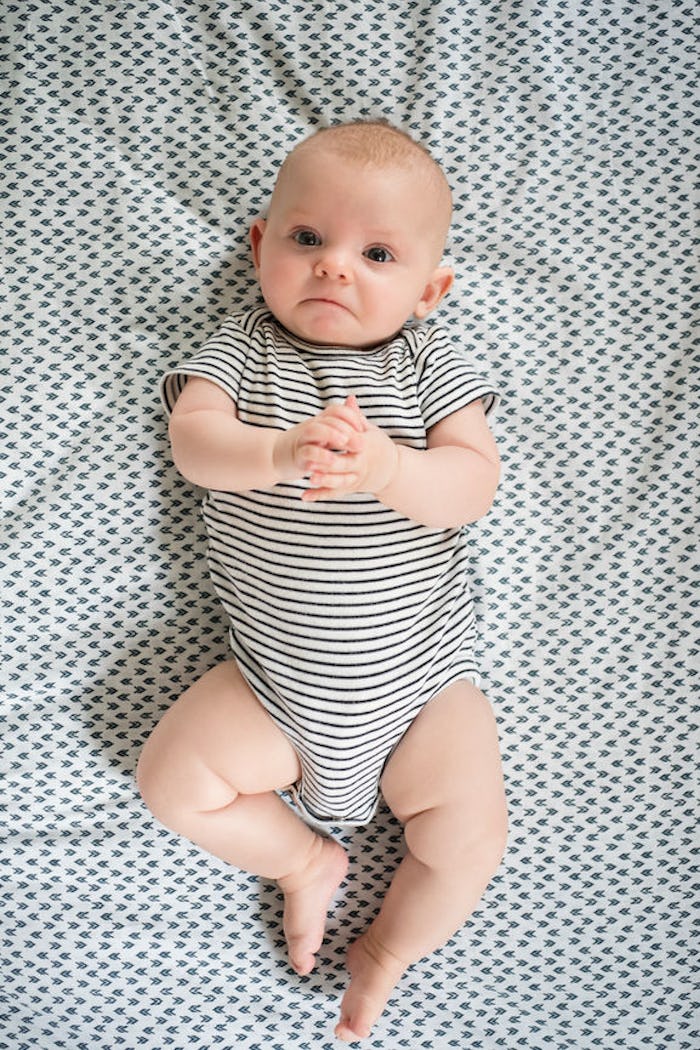Life

How To Get A 3-Month-Old Baby To Nap, According To A Sleep Expert
When you have a newborn, it goes without saying that all bets are off when it comes to sleep. It's a dizzying adjustment being on call around the clock. But when my little one reached the 3-month mark, I felt like things were starting to stabilize... somewhat. On good days, naps were beginning to have a semblance of order, yet on other days I was pulling my hair out wondering how to get my 3-month-old baby to nap, because nothing — short of strapping on the baby carrier and walking until my legs ached — seemed to work.
If you too find yourself going to great lengths to get your 3-month-old baby to sleep (driving around the block on repeat, or shushing until your lips literally feel numb, anyone?), then you'll be heartened to know that nap schedules typically start to develop around 3 to 4 months, according to Janet K. Kennedy, PhD, clinical psychologist and author of The Good Sleeper: The Essential Guide to Sleep for Your Baby (and You), and founder of NYC Sleep Doctor.
Assuming your baby is getting up for the day between 6 or 7 a.m., Dr. Kennedy says that somewhere around 3 months you'll start to see "the first nap of the day becoming more reliable and lengthening to an hour or more around 8 - 9 a.m. Over the weeks that follow, the second and third naps consolidate and become reliably timed as well."
However, while some babies do fall into natural sleep rhythms, that doesn't mean that naps will magically just happen. Parents have to be vigilant about looking for sleep cues, which can include a baby "rubbing their eyes, yawning, getting fussy, or turning their head away from you," according to Christine Stevens, a Washington D.C.-based sleep consultant and founder of Sleep Solutions by Christine, in an interview with Romper.
Another important strategy for achieving a predictable nap schedule is to keep an eye on the clock, particularly when it comes to how long your baby has been up since their last nap. "Up to 12 weeks of age, babies shouldn't be awake more than 45-60 minutes before needing another nap. Between 3-6 months, babies should only be awake about 2-2.5 hours before needing another nap. When you notice your baby's sleepy cues ... consider that it might be time for a nap," explains Stevens.
I can speak from personal experience that an overtired baby is much, much harder to get to sleep than one that is just hitting a nap window. Still, it would seem logical to assume that if you keep a baby awake longer, they'd sleep longer, but — and this is important — the opposite is actually true, according to Stevens: "It will be harder to get them to fall asleep, they'll have more broken sleep during the night and they'll wake up earlier in the morning."
If you find yourself with an overtired baby on your hands, there are still some things to do to help calm them, like swaddling, rocking, holding, feeding, playing white noise, and dimming the lights, according to Mom Junction.
Lastly, for many moms out there, the 3-month milestone also happens to coincide with the end of maternity leave, which means trusting a care provider to implement or execute a nap schedule. "Going back to work can be very stressful for moms. First, talk with your caregiver and have them follow a similar routine as you do at home. There's less confusion for baby when mom and caregivers do it the same way," advises Stevens. "Second, ask for feedback from a caregiver so that you can work together to develop the best nap schedule and sleep environment for baby."
Stevens also notes that it's perfectly normal if baby's sleep is a bit disrupted those first few weeks, since they're adjusting to a new routine, care giver, and/or environment.
No matter what your work situation is, know that it's always ok to reach out for help if you desperately need some Zzz's or just crave some order to your days. That's what sleep consultants — and your MIL, partner, and BFF — are for.